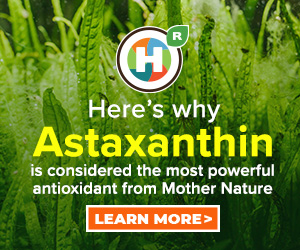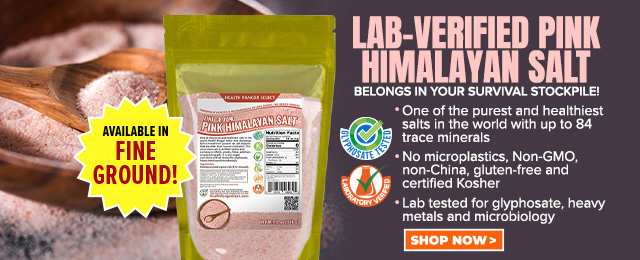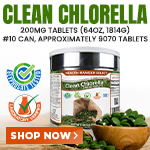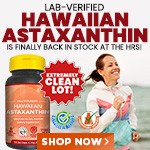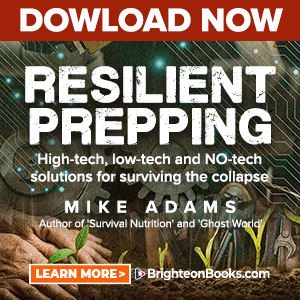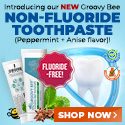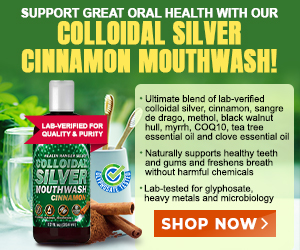
Chemicals Pass Through Breast Milk to Cause Testicular Cancer
Tuesday, February 09, 2010 by: David Gutierrez, staff writer
Tags: breast milk, testicular cancer, health news
- The hidden war above: Chemtrails, HAARP and the battle for planetary control
- CLOT SHOT PLANDEMIC UNFOLDING: Fibrous, rubbery clots caused by covid injections have prion-like seeding activity
- Widespread social and economic unrest: Steve Quayle issues urgent financial warning of imminent asset collapse in new interview with Mike Adams
- DEATH by VACCINE or face PRISON time: Canadian Freedom Convoy leaders CONVICTED for protesting forced vaccination during the Covid Plandemic
- Aerosolized bioweapons? Strange “diploid biomasses” falling out of the sky in Florida captured under the microscope
- Hidden toll: Federal secrecy shields wind industry's eagle deaths to protect land-hungry turbines that yield minimal power
- 7 Must-have multi-functional survival tools for every prepper
- Analysis: The coming economic collapse, a mass uprising and Trump's three secret weapons to halt the growing revolt
- Florida Senate passes bill banning geoengineering and weather modification and Governor DeSantis has indicated it will become law
- FBI imposed gag order on agents to silence Hunter Biden laptop truth before 2020 election, new chat logs reveal
- Idaho Gov. Brad Little vetoes Medical Freedom Act
- Defunding DEADLY mRNA jabs: Government funding for mRNA technology being scrutinized and sidelined until proven "safe and effective" for real
- How to detox from metals falling out of the sky
- “Project Aldrin”: Senate probes Meta's alleged censorship dealings with China
- Kiss Your Genetic Privacy Good-Bye! 23andMe Gets Green Light to Sell Your Intimate Genetic Details to Anyone They Want
- Global pedophile ring “Kidflix” shut down in landmark Europol operation
- Mike Adams releases country western hit single: Goin’ Back in Time is Comin’ Home
- Mark Zuckerberg's Meta allegedly trained AI on millions of stolen books from “shadow libraries”
- Newly released JFK files reveal Pentagon's role in creating Lyme disease and covid in the same lab
- European Court of Justice: Healthcare professionals who promoted or administered COVID-19 vaccines are CRIMINALLY LIABLE for any harm caused
- Aerosolized bioweapons? Strange “diploid biomasses” falling out of the sky in Florida captured under the microscope
- Oncologist warns of ‘terrifyingly aggressive’ cancers in children, linked to immune suppression from COVID vaccines
- Britain’s descent into police state censorship: Parents raided for questioning their daughter’s school system online
- Analysis: The coming economic collapse, a mass uprising and Trump's three secret weapons to halt the growing revolt
- Utah governor allows ban on LGBT pride flags in public buildings and schools, will take effect without his signature
- Kiss Your Genetic Privacy Good-Bye! 23andMe Gets Green Light to Sell Your Intimate Genetic Details to Anyone They Want
- FBI imposed gag order on agents to silence Hunter Biden laptop truth before 2020 election, new chat logs reveal
- The Health Ranger releases “Vaccine Zombie” song and music video, using AI-animated zombies for the music video
- DARPA: The shadowy innovator behind the world’s most advanced military technologies
- Mike Adams releases country western hit single: Goin’ Back in Time is Comin’ Home
- “Project Aldrin”: Senate probes Meta's alleged censorship dealings with China
- When antibiotics are unavailable, natural ANTIMICROBIAL compounds become essential first line defenses against infection
- AI-powered forecasting model proves more accurate than traditional systems at predicting the weather
- German researchers find link between mRNA vaccines and GENETIC CHANGES that precede CANCER and AUTOIMMUNE DISORDERS
- Dr. Mary Talley Bowden drops bombshells about children being permanently damaged by mRNA jabs during Tucker Carlson interview
- Ancient kitchen secrets REVEALED: How garlic, ginger and green onions fight cancer and heart disease
- Newly released JFK files reveal Pentagon's role in creating Lyme disease and covid in the same lab
- California's social media censorship law struck down: A victory for free speech or a threat to online safety?
- The Health Ranger releases “Vaccine Zombie” song and music video, using AI-animated zombies for the music video
- Dr. Mike Yeadon releases 15-minute testimony - WATCH - about genocidal intent of COVID “vaccines”
- EPA advisor admits the agency is funneling billions to climate groups ahead of Trump’s return to White House
- Rep. Nancy Mace introduces bill to ban biological males from female facilities on federal property
- Florida takes a stand: DeSantis proposes permanent ban on mRNA vaccine mandates
- Sugarcane extract superior to cholesterol-lowering drugs?
- Survival 101: Effective EMF blocking techniques
- Mike Adams releases country western hit single: Goin’ Back in Time is Comin’ Home
- OpenAI whistleblower who dissented against how the company trained ChatGPT found dead
- Attorney and TikTok influencer explains how he was offered hundreds of dollars to make false claims about Trump, Republicans
- CONSERVATIVES SOUND THE ALARM: Big Pharma and the Left trying to force $32 billion money grab from America’s seniors into year-end spending deal
- Pilots report mysterious lights 'moving at extreme speeds' across Oregon skies
- Trump expected to choose Kelly Loeffler as his agriculture secretary even though she was caught INSIDER TRADING during COVID
- Marketing director responsible for WOKE Jaguar rebrand is also an LGBT activist who supports Black Lives Matter
- Unpacking the Lies That We’ve Been Fed – new song and music video released by Mike Adams, the Health Ranger
- Poll: Majority of Ukrainians want peace negotiations to end war with Russia
- Red Cross issues warning to stop blood plasma donations from vaccinated people
- Scientists confirm: GENIUS brain function can be spontaneously unleashed in humans without any apparent cause
- EPA advisor admits the agency is funneling billions to climate groups ahead of Trump’s return to White House
- HYSSOP: What research reveals about the health benefits of this ancient holy herb
- Two containers with completed ballots fall out of truck in Florida
- Fully vaccinated about to see “tsunami” of illness and death, warns virologist
- Global leaders unite to clamp down on “misinformation” with UN-backed Cascais Declaration
- BREAKING: 2025 NDAA authorizes mandatory military draft of WOMEN across America… as Pentagon pursues global NUCLEAR war with both Russia and China at the same time
- Newly released JFK files reveal Pentagon's role in creating Lyme disease and covid in the same lab
- Michael Yon warns of a ZIONIST TAKEOVER in Trump’s second administration
- BOMBSHELL: DNA testing kits are a SCAM to develop ethnic-specific bioweapons
- Ozempic and Wegovy weight loss drugs are injectable LIZARD VENOM PEPTIDES that may unleash a devastating wave of organ failure… side effects align with symptoms of SNAKE BITES
- The Health Ranger releases “Vaccine Zombie” song and music video, using AI-animated zombies for the music video
- Israeli soldiers accused of even more torture and abuse in the West Bank
- These 13 countries just signed an agreement to engineer a global FAMINE by destroying food supply
- NASA admits that climate change occurs because of changes in Earth’s solar orbit, and NOT because of SUVs and fossil fuels
- RFK Jr. clears key hurdle: Sen. Susan Collins backs controversial HHS nominee, signaling a new era for health policy
- Sermon 30: How Jesus reveals Caesar’s FAKE CURRENCY and FALSE AUTHORITY
"Our findings reinforce the view that environmental exposure to [endocrine-disrupting chemicals] may explain some of the temporal and between-country differences in incidence of male reproductive disorders," said lead researcher Niels Skakkebaek.
Rates of testicular cancer, genital abnormalities, low semen quality, and other male reproductive disorders are four times higher in Denmark than in nearby Finland. These conditions have previously been linked to exposure to industrial chemicals that disrupt the hormonal (endocrine) system.
Endocrine disruptors have also been linked to birth defects, neurological problems, and increased rates of cancer and heart disease. The most dangerous chemicals are known as persistent organic pollutants, because they resist environmental degradation and accumulate in the environment.
Most of these chemicals bind to animal fat. As a consequence, animal-based foods tend to contain higher concentrations. So does human breast milk.
In the current study, researchers tested the breast milk of 68 women in Denmark and Finland for 121 different chemicals. They found significantly higher levels of pesticides, dioxins and polychlorinated biphenyls (PCBs) in the Danish breast milk.
The higher rates of testicular cancer and other reproductive disorders in Denmark may not be explained directly by contamination via breast milk. Breast milk contamination is thought to be a reliable marker of prenatal chemical exposure, which is likely to pose an even greater risk.
Skakkebaek stressed that women should not take the study as a reason to continue breast feeding, which has been shown to have "many beneficial effects for the child."
In addition to animal foods, people may be exposed to endocrine disruptors from pesticides, plastics, resins used to line food containers, and other chemicals used in manufacturing.
Sources for this story include: www.dailymail.co.uk.
Breast milk at FETCH.news
Get independent news alerts on natural cures, food lab tests, cannabis medicine, science, robotics, drones, privacy and more.
Take Action: Support Natural News by linking to this article from your website
Permalink to this article:
Embed article link: (copy HTML code below):
Reprinting this article:
Non-commercial use OK, cite NaturalNews.com with clickable link.
Follow Natural News on Facebook, Twitter, Google Plus, and Pinterest
Science News & Studies
Medicine News and Information
Food News & Studies
Health News & Studies
Herbs News & Information
Pollution News & Studies
Cancer News & Studies
Climate News & Studies
Survival News & Information
Gear News & Information
News covering technology, stocks, hackers, and more



"Big Tech and mainstream media are constantly trying to silence the independent voices that dare to bring you the truth about toxic food ingredients, dangerous medications and the failed, fraudulent science of the profit-driven medical establishment.
Email is one of the best ways to make sure you stay informed, without the censorship of the tech giants (Google, Apple, Facebook, Twitter, YouTube, etc.). Stay informed and you'll even likely learn information that may help save your own life."
–The Health Ranger, Mike Adams











